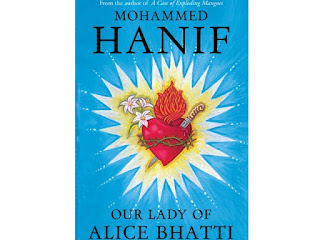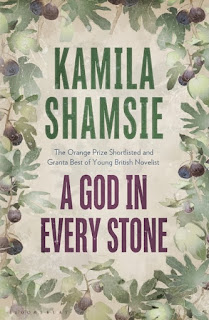By
Ullah, Inam Gul.
Hanif parts with his usual motifs
and recurrent scenes of jets, flights, engines and life of cadets and
professional soldiers, which are common features of his two other novels: ACase of Exploding Mangoes and The Red Birds, in Our Lady of Alice Bhatti. The
novel centers on the Christian community and the challenges it confronts in its
social milieu in Pakistan, especially the lower class Christians working as
janitors, the malpractices of doctors in medico-legal complications in
accomplice with the police, and the corruption of police force in Karachi
metropolis.
Alice Bhatti, daughter of a poor
janitor, after having spent fourteen months in prison for a sin she had never
committed, joins the Sacred Hospital as nurse. She was made a scapegoat for a
surgeon’s negligence during a surgical process. The hospital is frequented by
police in connection with medico-legal process, and in most cases they
manipulate the nature of such cases. Alice succumbs to a lovesick attitude displayed
by Teddy, a police tout working privately for police especially in illegal and
extra-judicial practices like fake encounters etc. The relationship ends up in
tying the knot between Alice and Teddy. Soon Teddy’s mind is welled up with
suspicions about Alice’s character coupled with his sudden unemployment, he throws
acids on Alice and she departs in a miraculous way.
Alice is blessed with certain
miraculous powers she displays during her professional duties at the hospital;
a strange miracle takes place at the moment of her demise. She is a tower of
strength against all the odds and adverse moves against her religion,
profession, caste, social and economic standing. She figures and ideal woman
neither confined nor discouraged by the adverse circumstances around her. She
moves ahead fights her way and finally stands triumphant. She does not give in
to the fanatic students during her college life, although she suffers yet she
resists and defends her religion and point of view, during her professional
duty at the night shift in the Sacred, she splashes penis of a spoiled brat and
resist his sexual advances. She comes from a janitor class Christian family,
but it does not hinder her way forward to a decent position of income. Despite
the plethora of challenges she ties the knot with a Muslim without any family
support, her mother working as a janitor was found dead in the house she was
working on, a rape cum murder case, and an aged father lives alone.
The novel depicts corruption and
malpractices among Karachi metropolis police, inspector Malangi resembles todays
Rao Anwar (ex SSP Karachi, indicted in Naqeebullah Mehsud murder). They are
involved in manipulation of cases on medico-legal ground and serving their own
vested interest. The idea of throwing acids on Alice also comes from inspector
Malangi.
The novel also shows the role of mafia
in religions, like Mullah the clergy dominance in Christianity. Alice
miraculous powers and especially the miracle of the throne of the holy mother are
not accepted by the clergy class and they question Alice’s character instead
because she belongs to the lower class of Christian community.
Hanif interestingly adds and
epilogue to the novel, a literary device very rare in modern fictions, a plea
by Alice’s father to the Vatican, explaining the miracle during Alice’s death
and highlights the biased decision of the local committee.
Categories:
Englis novel
English novels.
Mohammad Hanif
Our lady of Alice Bhatti
Pakistani literature in English
South Asian literature
Read More

